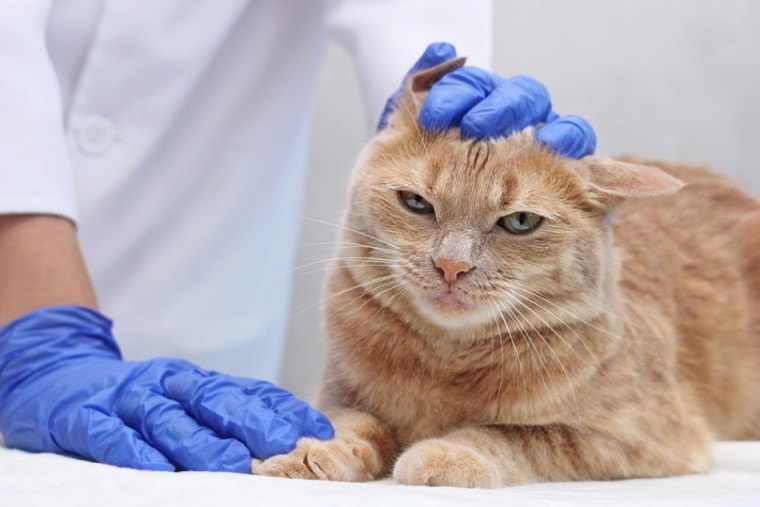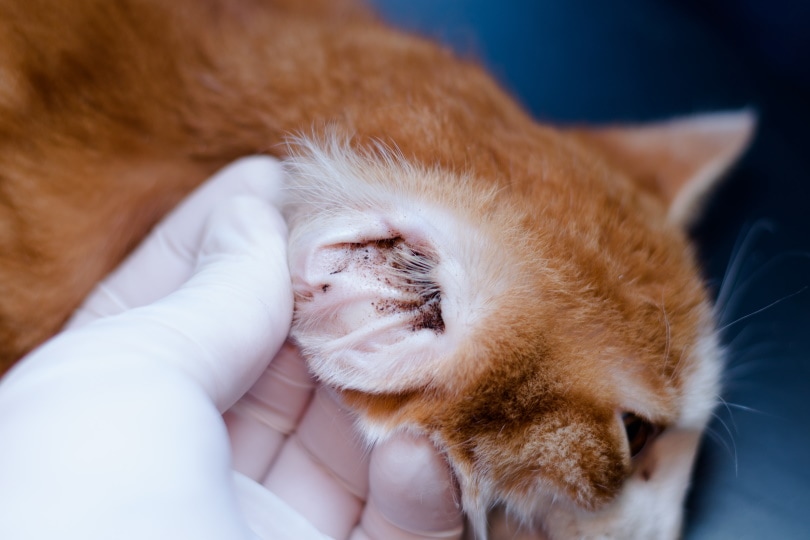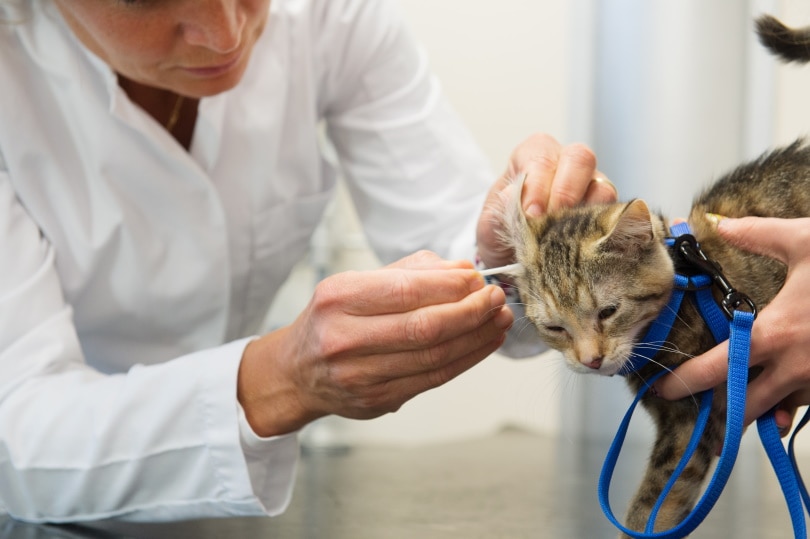
If your cat has ever had ear mites, you know it’s a dirty and uncomfortable condition that’s often difficult to treat. But because you live together, intimately, in close quarters, your curious mind might be asking: can humans catch ear mites from cats?
Ear mites typically pass from animal to animal and not so much to humans. But there are still a few things that you should be aware of.
Here, we discuss everything ear mites, how you can tell if your cat has them, and how to treat them. We also look at what happens if a human does get ear mites.
What Are the Signs of Ear Mites?

Ear mites (Otodectes cynotis) are a specific kind of mite that takes up residence in an animal’s ear canal. They feed on skin oils and ear wax found in the ear, but they can actually be found almost anywhere on the animal’s body. They simply prefer the ears for the ear wax.
If you’ve noticed some or all these symptoms and you haven’t already brought your cat to the vet, make an appointment. You can discuss the best way to treat your cat’s ear mites at that time.
How Are Ear Mites Treated?

Once your cat has been diagnosed with ear mites, your vet will tell you that you’ll need to treat all other animals in your household in addition to your cat. Everything in your home will also need to be cleaned, particularly your pet’s bedding and anywhere else that they spend a great deal of time.
Before you begin the mite treatment, you’ll need to clean your cat’s ears with an ear cleaner designed specifically for pets. This will help remove most of the ear mites before you treat for them.
There are medications that help treat various parasites, such as fleas, as well as ear mites, and others that just treat ear mites. The latter ear mite medication can be purchased without a prescription, but others will need a prescription from your vet.
Treatment involves placing drops in your cat’s ears and massaging them in, which should be continued for about a week to a week and a half.
You can also try out natural remedies, such as apple cider vinegar, aloe vera, and organic honey, but discuss these with your vet first.
Your best bet is to also treat your cat for fleas because ear mites and fleas tend to occur around the same time. If left untreated, ear mites will make your cat tremendously uncomfortable, and they can lead to partial or total hearing loss.
When Do People Get Ear Mites?

For a person to get ear mites is a rare occasion, but it can happen. Ear mites in humans can occasionally occur when a mite is looking for a host because it can’t survive for long without one.
If your cat has ear mites and you’re sharing a bed or other furniture that your cat spends time on, it increases the chance of your getting infected.
If you have more than one of these signs, see your doctor immediately. Just like with cats, untreated ear mites in humans can lead to some form of hearing loss. Ear mites do not go away without treatment.
How Are Ear Mites Treated in People?

Your doctor might recommend that you go to an otolaryngologist (also known as an ear, nose, and throat specialist). The doctor will swab your ear and check it with an otoscope, which can visually confirm ear mites.
The doctor will start by flushing your ear with saline to eradicate the excess ear wax and will prescribe ear drops meant to help relieve the inflammation and itching of your ears. They will also provide you with antiparasitic ear drops to kill the mites and their eggs.
Your doctor might additionally prescribe an antibiotic to help prevent any secondary infections that might occur because of the ear mites.
How Can You Stop Ear Mites From Coming Back?
If your cat seems to have a recurring problem with ear mites, you should work with your vet on an effective treatment and preventive plan. This might include antiparasitic medication every month.
At the first sign of an ear mite infestation, take your cat immediately to the vet so you can get it treated as soon as possible. Become familiar with the symptoms of ear mites so you can react and deal with the situation sooner rather than later.
If you have other pets, you’ll probably need to have all of them treated so they don’t keep passing the ear mites back and forth to each other. Additionally, any pet that has confirmed ear mites should be quarantined away from the other pets.
Be sure to sanitize and clean any bedding or things that your cat has been in contact with. Wash everything in hot water. For yourself, avoid sharing your bed or sitting with your cat on any furniture until the ear mites have been completely eliminated.
Wrapping Up
If you’re concerned about your cat getting ear mites, other than making yourself familiar with the typical signs, you should also routinely check your cat’s ears.
If your cat does have ear mites, be aware of your own possible signs. Pressure in your ear, tinnitus, and itchy and irritated ears are all signs and should be looked at right away. The chances of you getting ear mites from your cat are slim, but it’s still a good idea to not get all up and personal with your cat while they have ear mites.
- Related read: Can Humans Get Worms From Cats? What You Need To Know!
Featured Image Credit: YULIYA Shustik, Shutterstock








